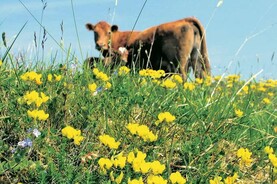The Department of Agriculture is seeking submissions of interest for additional bluetongue (BTV) testing services.
The move is in case of the event of a BTV outbreak in the country, as demand for testing may exceed existing laboratory capacity provided currently by the Irish national reference laboratory.
In the event of a confirmed outbreak, it is likely that enhanced active surveillance testing of susceptible animals (mainly cattle, sheep and goats) will be carried out.
The Department said that PCR tests on blood samples to detect BTV in animals will likely be an important tool in this response.
Therefore, the Department is now conducting a consultation process to determine the level of interest there might be in tendering for the provision of additional BTV testing services.

The Department said that PCR tests on blood samples to detect BTV in animals will likely be an important tool in this response.
A guideline estimate of around 10,000 blood samples to be PCR tested every year is required.
However, this may vary according to policy decisions, the epidemiological situation and in response to disease risk.
Outbreak
Blood samples would need to be received and tested within 72 hours of sampling. Written submissions will be accepted until 5pm on Friday 27 June.
Ireland is currently free of bluetongue.
BTV serotype 3 was first detected in the Netherlands in September 2023 and has since spread widely across mainland Europe and Britain, meaning the risk of an outbreak in Ireland has increased.
In the event of an outbreak, the disease control measures taken by the Department of Agriculture will also depend on factors such as time of year, outbreak location, average temperatures, the epidemiological situation and the availability of vaccinations.
Read more
Bluetongue restrictions for cattle moving into Wales
Vaccination rollout against Bluetongue in Britain
Risk from exotic animal diseases higher than ever – Heydon
Bluetongue disease: what it is and how does it spread?
The Department of Agriculture is seeking submissions of interest for additional bluetongue (BTV) testing services.
The move is in case of the event of a BTV outbreak in the country, as demand for testing may exceed existing laboratory capacity provided currently by the Irish national reference laboratory.
In the event of a confirmed outbreak, it is likely that enhanced active surveillance testing of susceptible animals (mainly cattle, sheep and goats) will be carried out.
The Department said that PCR tests on blood samples to detect BTV in animals will likely be an important tool in this response.
Therefore, the Department is now conducting a consultation process to determine the level of interest there might be in tendering for the provision of additional BTV testing services.

The Department said that PCR tests on blood samples to detect BTV in animals will likely be an important tool in this response.
A guideline estimate of around 10,000 blood samples to be PCR tested every year is required.
However, this may vary according to policy decisions, the epidemiological situation and in response to disease risk.
Outbreak
Blood samples would need to be received and tested within 72 hours of sampling. Written submissions will be accepted until 5pm on Friday 27 June.
Ireland is currently free of bluetongue.
BTV serotype 3 was first detected in the Netherlands in September 2023 and has since spread widely across mainland Europe and Britain, meaning the risk of an outbreak in Ireland has increased.
In the event of an outbreak, the disease control measures taken by the Department of Agriculture will also depend on factors such as time of year, outbreak location, average temperatures, the epidemiological situation and the availability of vaccinations.
Read more
Bluetongue restrictions for cattle moving into Wales
Vaccination rollout against Bluetongue in Britain
Risk from exotic animal diseases higher than ever – Heydon
Bluetongue disease: what it is and how does it spread?







 This is a subscriber-only article
This is a subscriber-only article










SHARING OPTIONS: